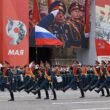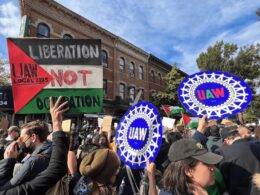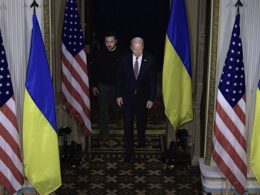Image above is from United World
To understand the class struggle in the modern United States, one needs to look at the shift in the nature of U.S. capital that took place during the second half of the nineteenth century. In the first half of the country’s history, when the primary form of U.S. imperialism was Native land theft, the foundational basis for the wealth and power of the U.S. ruling class was primitive accumulation. The initial forms of colonization, where colonial or settler-colonial states stole indigenous territories and resources, represented the greatest geographical and economic extent of U.S. capital’s exploitative operations during this stage. The colonization of tribal lands was what made it possible for the country’s capitalists to not just extract the continent’s natural capital, but also have a land on which they could enslave Africans and exploit workers. Therefore if you were an anti-imperialist in the United States during this time, the occupation of First Nations lands was the foremost type of imperialism for you to focus on.
Then a change came to the nature of U.S. capital. One that made it so the ruling class was now primarily invested not within the colonial project inside U.S. borders, but rather within international monopolies. When capitalism advanced to its monopoly stage, there came to be an incentive for the country’s rulers to expand their colonial project. This turned into neo-colonialism, where the imperial powers exploit the formerly colonized world via corporate ventures within the “independent” Global South countries. And to ensure that the imperialists could maintain access to these sources of extraction, which are absolutely crucial during capital’s monopoly stage, they had to ensure that they could wage war at any time they needed to.
This is why foreign policy is paramount: we mount an effective resistance towards imperialism’s wars, and the entire system becomes at risk. Monopoly finance capital, and the foreign policy paradigm it relies upon, must be our foremost targets at this stage in the class struggle. Because if we act like the fight against U.S. hegemony is secondary, our capitalist dictatorship will be able to carry on. We can only defeat this dictatorship by recognizing where its most essential modern features are.
Because U.S. imperialism has been able to advance to this global stage; to relocate its prime capital source to the realm of international corporations and financial institutions; it’s now expedient for our ruling class to cultivate a layer of “anti-colonial” controlled opposition. So long as “anti-colonialism” exists in a pro-capitalist form, or in a form that the elites can pit against the anti-imperialist movement, anti-colonialism is not something which threatens the system. It’s another thing that the system can use to its advantage. This is what’s crucial for today’s U.S. communists to recognize: the anti-colonial movement, and all the other parts of our domestic struggle, can only succeed on the basis of seriously confronting international monopoly capital. We embrace an “anti-colonialism” that impedes the goals of this global-scale struggle, and we end up as tools for the empire to manage dissent.
NATO’s Ukraine proxy war, and the recent acts of antiwar resistance it’s provoked, show how a revolutionary practice which centers around foreign policy can genuinely threaten our ruling institutions. The organizations that have backed Russia against the imperialists, and have built coalitions with each other in the interests of maximally combating NATO, are the orgs which the centers of power have felt the need to attack the most. The Party of Communists USA, the Center for Political Innovation, the African People’s Socialist Party, and their organizing partners have all been getting increasingly treated as authentic threats during the last several years. MSNBC’s Rachel Maddow has bothered to lambast their rallies, the feds have begun indicting them (with the APSP being the first one to get targeted this way so far), and COINTELPRO has done the most to try to destroy them.
The fear on the part of the ruling class is that these orgs will gain enough momentum to bring about a serious mass mobilization against the war machine. One where regular workers are again advancing a practice of solidarity with imperialism’s challengers, like was briefly happening in the 20th century before the feds crushed the U.S. communist movement.
That golden age for American communism, where the CPUSA was yet to be compromised and could act as a conduit for working-class internationalism, was able to manifest because these communists took on the correct Marxist orientation for the monopoly age. They were able to accurately diagnose their conditions, which called not for slogans like “death to America” but for declarations of unity with the Soviet people. (One could claim it’s possible to advance both, but this would simply undermine one’s attempts at anti-imperialist outreach.) Applying Dimitrov’s recommendation that communists not sneer at the national sentiments of the workers within their own countries, they successfully built a mass proletarian movement. One that we can rebuild and bring to victory, if we also hit the ruling elites where it truly hurts them at this moment. If we target their foreign policy narratives, and their means for holding back the class struggle via radical liberal movement infiltration.
Radical liberalism is dangerous towards the class struggle because it takes an idealist view of what the struggle should look like. It acts as if U.S. capital’s primary tool is still primitive accumulation, ignoring the preeminence that international monopolism has taken on within the structure of capitalist power.
Absolutely the First Nations need to be freed from the modern types of colonial primitive accumulation. Absolutely they should be able to control their own resources, without having to face off against police who brutalize them for demanding water rights on their own land. They’ll never get freedom, and nor will all the other peoples who are subjugated by capital, as long as the international monopolies are allowed to operate with impunity. And that is what the elements of the left which sacrifice the global struggle are doing: letting capital’s greatest sources of strength go unchallenged.
Obviously we don’t need to forsake all parts of our domestic struggles. In fact, we should forsake no parts of these struggles. The important thing is that we don’t let this weaken our efforts to combat U.S. hegemony in any way. No rejecting allies in the antiwar cause just because they don’t align with us on every domestic issue. No seeking to distance ourselves from any of the global forces fighting imperialism, like liberals have done by disavowing Hamas or like certain Marxists have done by disavowing Russia. We can take advantage of the system’s unprecedented weaknesses, if we properly navigate the conditions we’re facing.
————————————————————————
If you appreciate my work, I hope you become a one-time or regular donor to my Patreon account. Like most of us, I’m feeling the economic pressures amid late-stage capitalism, and I need money to keep fighting for a new system that works for all of us. Go to my Patreon here.
To keep this platform effective amid the censorship against dissenting voices, join my Telegram channel.








